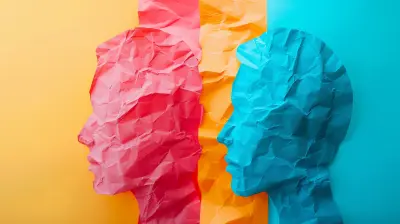How Sleep Impacts Stress and What You Can Do About It
19 November 2025
We’ve all been there—tossing and turning at night, mind racing with to-do lists, worries, and “what ifs.” Then the next day, everything feels a bit harder. You’re groggy, snappy, and just not on your game. Sound familiar? That’s the not-so-fun dance between sleep and stress doing its thing.
But here's the good news: You have more control over this relationship than you might think. Let’s dive deep into how sleep impacts stress and what you can actually do to break the cycle, feel better, and finally get some peace—both in your mind and your bed.
What’s the Deal Between Sleep and Stress?
Sleep and stress have a pretty intense relationship. It’s a bit like a bad breakup: one affects the other, and neither wants to give in. When you’re stressed, your sleep suffers. And when your sleep suffers, your stress levels shoot through the roof. It's a vicious cycle.Let’s break it down.
When you're stressed, your body releases cortisol (your trusty, but overactive, stress hormone). Cortisol is useful when you’re running from a bear, not so helpful when you’re trying to unwind and drift off. It keeps your brain alert when it should be powering down. So even if you do manage to sleep, it’s often light, restless, and not particularly restorative.
Now on the flip side, lack of sleep affects how your brain processes emotions. Without enough rest, your amygdala—your brain’s emotional center—goes into overdrive. You become more reactive, more sensitive, and yep, more stressed. Sleep deprivation also makes it harder to concentrate, solve problems, and cope with daily annoyances. Doesn’t that sound like the perfect storm?
So yeah, sleep and stress are definitely tied at the hip.
The Science Behind Sleep and Stress
Here’s a peek at what’s going on behind the scenes in your brain and body.When you sleep, your brain goes through different cycles—REM (rapid eye movement) and non-REM sleep. These cycles help consolidate memories, regulate emotions, and repair your body. Deep sleep, in particular, is like a nightly tune-up for your nervous system.
But if you're stressed out, your brain has a hard time entering and staying in that deep sleep phase. Your heart rate stays elevated, your muscles stay tense, and your thoughts just won’t shut up. It's like your body's trying to sleep with one eye open—alert and on edge.
In short? Stress messes with sleep architecture. And poor sleep messes with your ability to handle stress. It’s not just about feeling tired; it’s about how your brain and body function day-to-day.
Common Signs You’re Caught in the Stress-Sleep Loop
If you’re not sure whether stress and sleep issues are tag-teaming to make your life a little harder, here are some warning signs to watch for:- Waking up multiple times during the night
- Struggling to fall asleep even when you’re exhausted
- Having racing thoughts at bedtime
- Feeling fatigued even after 7–8 hours of sleep
- Waking up too early and not being able to drift back to sleep
- Feeling wired or anxious throughout the day
Recognize any of those? You’re not alone. Millions of people are stuck in this loop—and it’s exhausting, physically and emotionally. But here’s the kicker: you’re not powerless.
What You Can Do About It: Habits That Help
The good news is that there are changes you can make—right now—that can significantly improve both your sleep and stress levels. No magic pills. Just practical, research-backed strategies.1. Create a Wind-Down Routine
Think of this as a cue to your mind and body that it’s time to chill out. About 30–60 minutes before bed, start a deliberate wind-down routine:- Turn off bright screens and dim the lights
- Take a warm shower or bath
- Do some light stretching or deep breathing
- Read a physical book (fiction is great!)
- Listen to calming music
These small rituals tell your nervous system, “Hey, it’s safe to relax now.” And over time, this signals your body to fall asleep faster and sleep more deeply.
2. Go to Bed and Wake Up at the Same Time Every Day
Yes, even on weekends! Keeping your body on a consistent schedule regulates your internal clock, or circadian rhythm. A regular rhythm = better sleep = lower stress.When your body knows when to shut down and when to wake up, everything else tends to line up better—mood, energy, focus, you name it.
3. Move Your Body (But Not Right Before Bed)
Exercise is a game changer for both stress and sleep. Just 20–30 minutes a day of walking, yoga, or dancing around your living room can make a huge difference.Exercise reduces cortisol levels and releases feel-good endorphins. Just try to avoid intense activity too close to bedtime, since that can rev you up and make it harder to settle down.
4. Limit Caffeine and Alcohol
Caffeine can sneak into your system even hours after your last cup of coffee—especially if you're sensitive to it. Try cutting off caffeine by early afternoon.Alcohol might make you sleepy at first, but it messes with your sleep cycles and reduces REM sleep. So you might pass out quickly but wake up feeling groggy.
Instead? Try herbal teas like chamomile or peppermint. They’re calming, caffeine-free, and cozy. Win-win.
5. Write It Out
If your brain loves to go on a 3 a.m. overthinking spree, try journaling before bed. Jot down your worries, your plans for the next day, or even something you’re grateful for. It’s like taking out the mental trash so your mind can rest.Bonus: Gratitude journaling is linked with better sleep and lower stress levels. Who knew being thankful could literally help you snooze?
6. Limit Screen Time in the Evenings
We get it—Netflix and your phone feel comforting after a stressful day. But blue light from screens can trick your brain into thinking it’s still daytime, messing with melatonin (your sleepy hormone).Try powering down devices at least an hour before bed. If that feels impossible, at least use night mode or blue light filters.
7. Create a Sleep-Friendly Environment
Make your bedroom your sanctuary. Cool, dark, and quiet is the goal.- Blackout curtains or an eye mask block light
- White noise machines or earplugs reduce disruptive sounds
- A cool room temperature (around 65°F or 18°C) helps your body relax
Add cozy blankets, soft sheets, or even a weighted blanket for extra comfort and calm.
When to Seek Help
Sometimes, even with your best efforts, sleep and stress just won’t cooperate. If you’re experiencing chronic insomnia, panic attacks, or feel overwhelmed more often than not, it might be time to talk to a professional.Therapists, especially those trained in Cognitive Behavioral Therapy for Insomnia (CBT-I), can help you get to the root of the issue. And sometimes medical conditions like anxiety disorders, depression, or sleep apnea could be at play.
There’s absolutely no shame in getting help. In fact, it’s one of the bravest and most self-loving things you can do.
The Bottom Line: Small Changes, Big Results
Sleep, as boring as it might seem, is one of your body’s superpowers. It’s not wasted time—it’s fuel. It’s repair. It’s emotional balance. And when you sleep better, you stress less. Simple as that.Of course, it’s a journey. Don’t expect to go from zombie to zen overnight. But if you start to shift your habits—even just one or two at a time—you’ll start to see changes.
Sleep isn’t just about shutting your eyes. It’s about giving your mind and body the deep rest they need to reset and recharge. And when you can finally get a good night’s sleep? Everything else feels a little more manageable.
So tonight, instead of scrolling through your phone or replaying the day’s drama, try something different. Set a wind-down routine. Make your space cozy. Give yourself permission to rest.
Your body (and your stress levels) will thank you for it.
all images in this post were generated using AI tools
Category:
Stress ReliefAuthor:

Gloria McVicar
Discussion
rate this article
1 comments
Jordan Martin
Great insights! 🌟 A good night's sleep is like a superhero cape for managing stress. Let’s face it, who doesn’t feel better after a cozy snooze? Prioritize that pillow time, and watch your worries fade away! 😴✨
November 24, 2025 at 3:47 PM

Gloria McVicar
Thank you! Absolutely, quality sleep is essential for stress management. Prioritizing rest truly makes a difference! 😴✨


